Detailed Analysis of ASIC v Vizard Case and Corporation Act Duties
VerifiedAdded on 2021/06/17
|9
|2366
|32
Report
AI Summary
This report provides a detailed analysis of the ASIC v Vizard case, which revolves around the breach of director's duties under the Corporation Act 2001. The report examines the facts of the case, highlighting how the director improperly used company information for personal gain, leading to a breach of sections 180, 181, and 183 of the Act. It discusses the duties breached, the court's decision, and the case's impact on director's responsibilities. The analysis covers the legal principles, defenses available to directors, and the consequences of non-compliance, including potential penalties and license cancellation. The report emphasizes the importance of acting in good faith and in the best interest of the company, as stipulated by the Corporation Act, and how the court's ruling in ASIC v Vizard reinforces these principles. It also references relevant case law like ASIC v Adler and ASIC v Rich to provide a comprehensive understanding of the legal context.
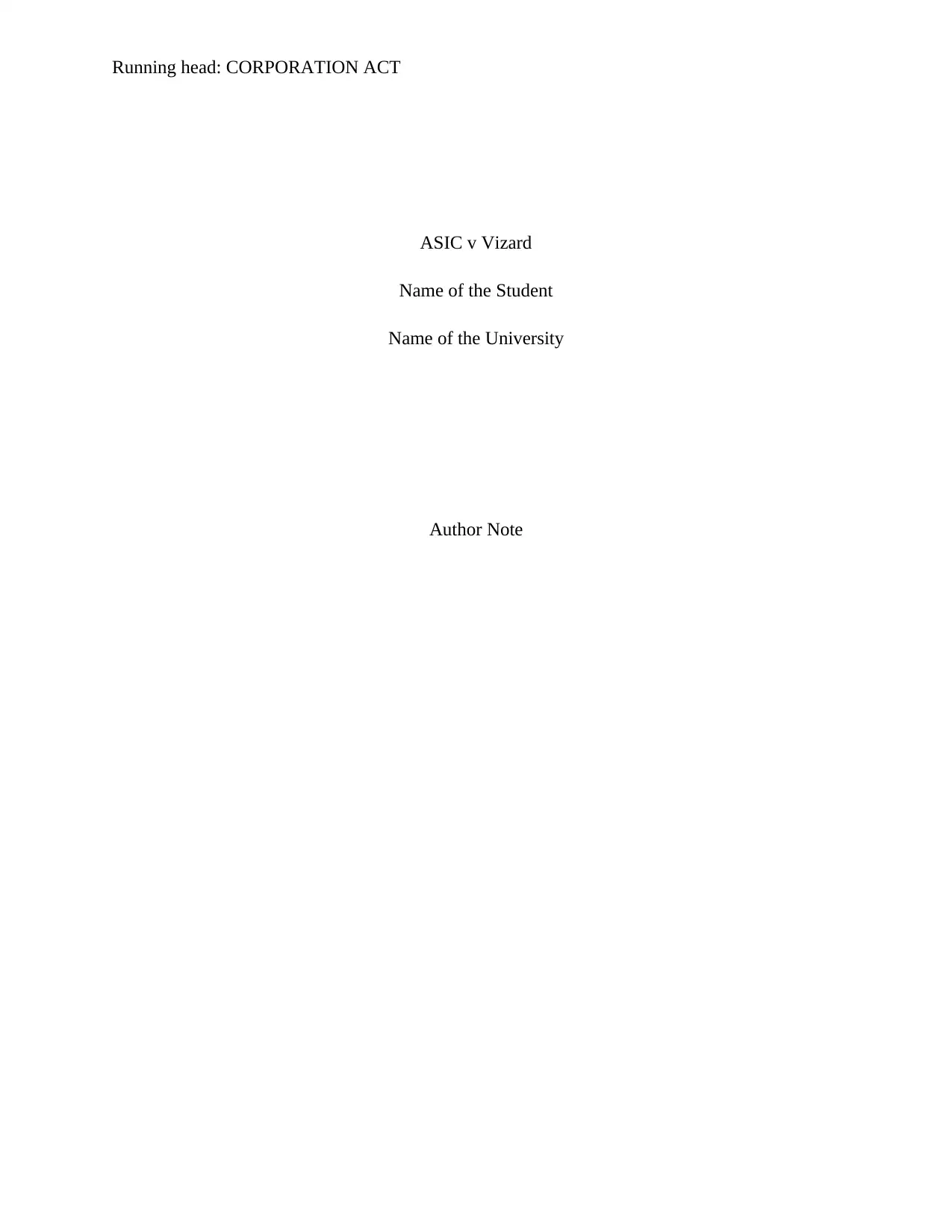
Running head: CORPORATION ACT
ASIC v Vizard
Name of the Student
Name of the University
Author Note
ASIC v Vizard
Name of the Student
Name of the University
Author Note
Paraphrase This Document
Need a fresh take? Get an instant paraphrase of this document with our AI Paraphraser

1CORPORATION ACT
Table of Contents
Introduction:....................................................................................................................................2
Discussion:.......................................................................................................................................2
Brief facts:...................................................................................................................................2
Duties breached:..........................................................................................................................4
Decision of the court:...................................................................................................................5
Impact of the case:.......................................................................................................................6
Conclusion:......................................................................................................................................7
Reference:........................................................................................................................................8
Table of Contents
Introduction:....................................................................................................................................2
Discussion:.......................................................................................................................................2
Brief facts:...................................................................................................................................2
Duties breached:..........................................................................................................................4
Decision of the court:...................................................................................................................5
Impact of the case:.......................................................................................................................6
Conclusion:......................................................................................................................................7
Reference:........................................................................................................................................8
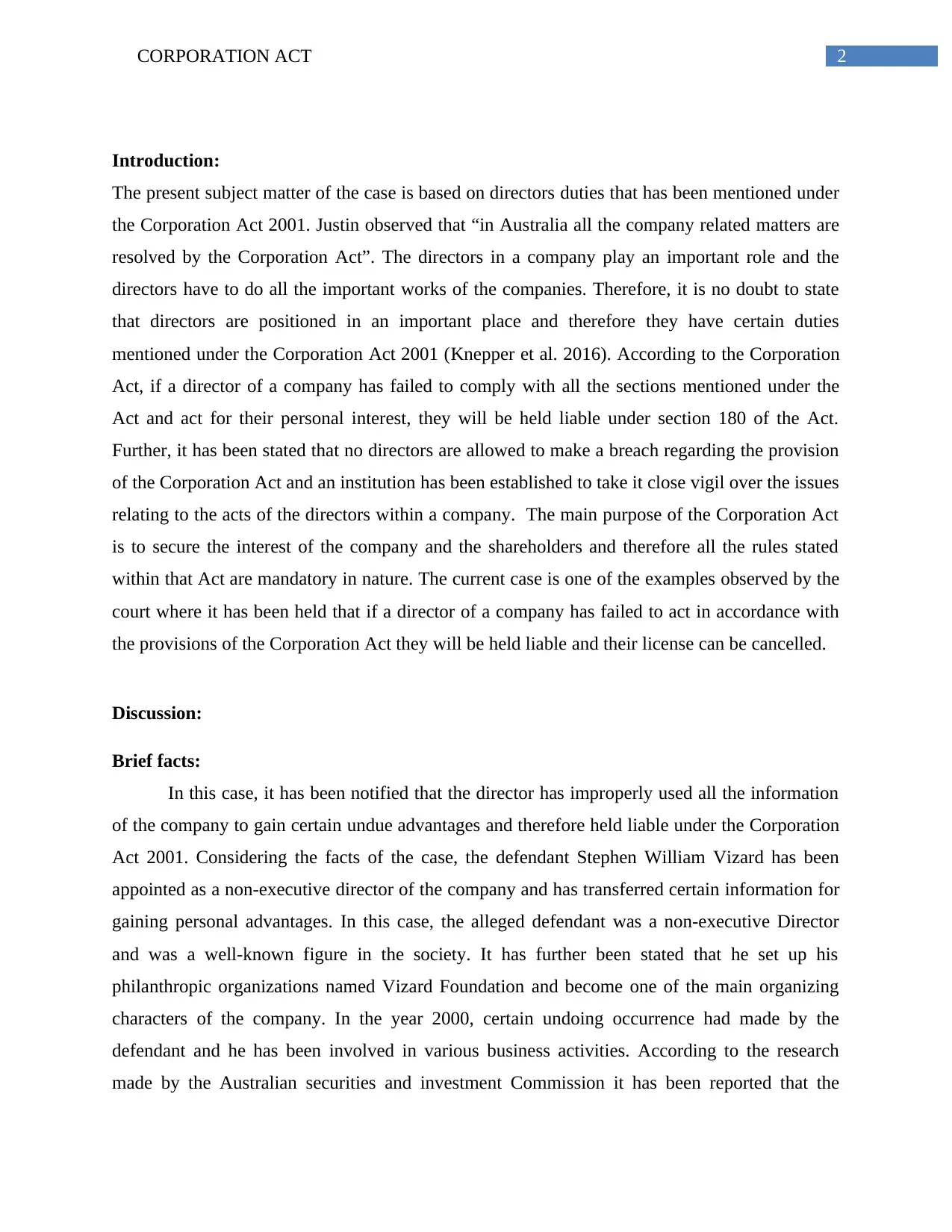
2CORPORATION ACT
Introduction:
The present subject matter of the case is based on directors duties that has been mentioned under
the Corporation Act 2001. Justin observed that “in Australia all the company related matters are
resolved by the Corporation Act”. The directors in a company play an important role and the
directors have to do all the important works of the companies. Therefore, it is no doubt to state
that directors are positioned in an important place and therefore they have certain duties
mentioned under the Corporation Act 2001 (Knepper et al. 2016). According to the Corporation
Act, if a director of a company has failed to comply with all the sections mentioned under the
Act and act for their personal interest, they will be held liable under section 180 of the Act.
Further, it has been stated that no directors are allowed to make a breach regarding the provision
of the Corporation Act and an institution has been established to take it close vigil over the issues
relating to the acts of the directors within a company. The main purpose of the Corporation Act
is to secure the interest of the company and the shareholders and therefore all the rules stated
within that Act are mandatory in nature. The current case is one of the examples observed by the
court where it has been held that if a director of a company has failed to act in accordance with
the provisions of the Corporation Act they will be held liable and their license can be cancelled.
Discussion:
Brief facts:
In this case, it has been notified that the director has improperly used all the information
of the company to gain certain undue advantages and therefore held liable under the Corporation
Act 2001. Considering the facts of the case, the defendant Stephen William Vizard has been
appointed as a non-executive director of the company and has transferred certain information for
gaining personal advantages. In this case, the alleged defendant was a non-executive Director
and was a well-known figure in the society. It has further been stated that he set up his
philanthropic organizations named Vizard Foundation and become one of the main organizing
characters of the company. In the year 2000, certain undoing occurrence had made by the
defendant and he has been involved in various business activities. According to the research
made by the Australian securities and investment Commission it has been reported that the
Introduction:
The present subject matter of the case is based on directors duties that has been mentioned under
the Corporation Act 2001. Justin observed that “in Australia all the company related matters are
resolved by the Corporation Act”. The directors in a company play an important role and the
directors have to do all the important works of the companies. Therefore, it is no doubt to state
that directors are positioned in an important place and therefore they have certain duties
mentioned under the Corporation Act 2001 (Knepper et al. 2016). According to the Corporation
Act, if a director of a company has failed to comply with all the sections mentioned under the
Act and act for their personal interest, they will be held liable under section 180 of the Act.
Further, it has been stated that no directors are allowed to make a breach regarding the provision
of the Corporation Act and an institution has been established to take it close vigil over the issues
relating to the acts of the directors within a company. The main purpose of the Corporation Act
is to secure the interest of the company and the shareholders and therefore all the rules stated
within that Act are mandatory in nature. The current case is one of the examples observed by the
court where it has been held that if a director of a company has failed to act in accordance with
the provisions of the Corporation Act they will be held liable and their license can be cancelled.
Discussion:
Brief facts:
In this case, it has been notified that the director has improperly used all the information
of the company to gain certain undue advantages and therefore held liable under the Corporation
Act 2001. Considering the facts of the case, the defendant Stephen William Vizard has been
appointed as a non-executive director of the company and has transferred certain information for
gaining personal advantages. In this case, the alleged defendant was a non-executive Director
and was a well-known figure in the society. It has further been stated that he set up his
philanthropic organizations named Vizard Foundation and become one of the main organizing
characters of the company. In the year 2000, certain undoing occurrence had made by the
defendant and he has been involved in various business activities. According to the research
made by the Australian securities and investment Commission it has been reported that the
⊘ This is a preview!⊘
Do you want full access?
Subscribe today to unlock all pages.

Trusted by 1+ million students worldwide
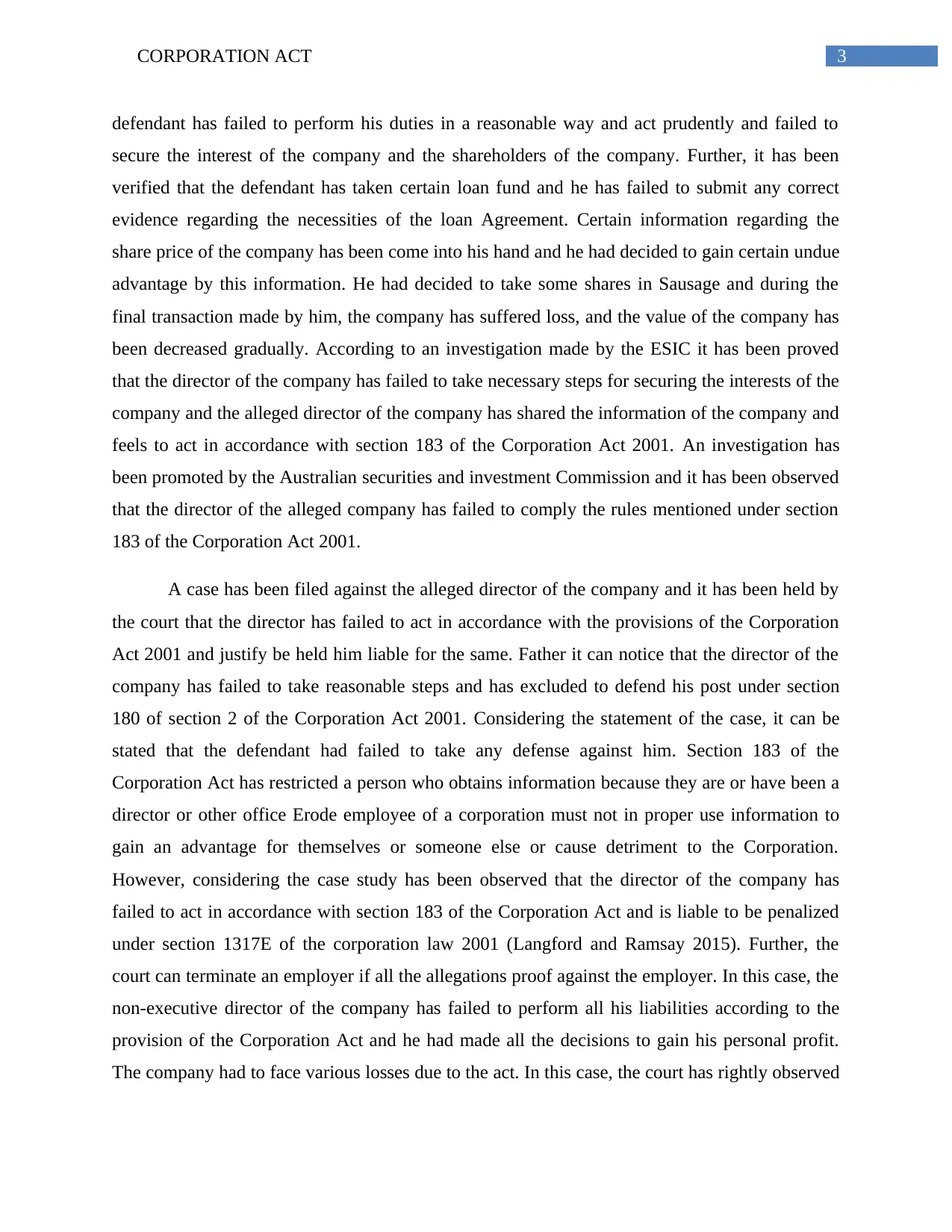
3CORPORATION ACT
defendant has failed to perform his duties in a reasonable way and act prudently and failed to
secure the interest of the company and the shareholders of the company. Further, it has been
verified that the defendant has taken certain loan fund and he has failed to submit any correct
evidence regarding the necessities of the loan Agreement. Certain information regarding the
share price of the company has been come into his hand and he had decided to gain certain undue
advantage by this information. He had decided to take some shares in Sausage and during the
final transaction made by him, the company has suffered loss, and the value of the company has
been decreased gradually. According to an investigation made by the ESIC it has been proved
that the director of the company has failed to take necessary steps for securing the interests of the
company and the alleged director of the company has shared the information of the company and
feels to act in accordance with section 183 of the Corporation Act 2001. An investigation has
been promoted by the Australian securities and investment Commission and it has been observed
that the director of the alleged company has failed to comply the rules mentioned under section
183 of the Corporation Act 2001.
A case has been filed against the alleged director of the company and it has been held by
the court that the director has failed to act in accordance with the provisions of the Corporation
Act 2001 and justify be held him liable for the same. Father it can notice that the director of the
company has failed to take reasonable steps and has excluded to defend his post under section
180 of section 2 of the Corporation Act 2001. Considering the statement of the case, it can be
stated that the defendant had failed to take any defense against him. Section 183 of the
Corporation Act has restricted a person who obtains information because they are or have been a
director or other office Erode employee of a corporation must not in proper use information to
gain an advantage for themselves or someone else or cause detriment to the Corporation.
However, considering the case study has been observed that the director of the company has
failed to act in accordance with section 183 of the Corporation Act and is liable to be penalized
under section 1317E of the corporation law 2001 (Langford and Ramsay 2015). Further, the
court can terminate an employer if all the allegations proof against the employer. In this case, the
non-executive director of the company has failed to perform all his liabilities according to the
provision of the Corporation Act and he had made all the decisions to gain his personal profit.
The company had to face various losses due to the act. In this case, the court has rightly observed
defendant has failed to perform his duties in a reasonable way and act prudently and failed to
secure the interest of the company and the shareholders of the company. Further, it has been
verified that the defendant has taken certain loan fund and he has failed to submit any correct
evidence regarding the necessities of the loan Agreement. Certain information regarding the
share price of the company has been come into his hand and he had decided to gain certain undue
advantage by this information. He had decided to take some shares in Sausage and during the
final transaction made by him, the company has suffered loss, and the value of the company has
been decreased gradually. According to an investigation made by the ESIC it has been proved
that the director of the company has failed to take necessary steps for securing the interests of the
company and the alleged director of the company has shared the information of the company and
feels to act in accordance with section 183 of the Corporation Act 2001. An investigation has
been promoted by the Australian securities and investment Commission and it has been observed
that the director of the alleged company has failed to comply the rules mentioned under section
183 of the Corporation Act 2001.
A case has been filed against the alleged director of the company and it has been held by
the court that the director has failed to act in accordance with the provisions of the Corporation
Act 2001 and justify be held him liable for the same. Father it can notice that the director of the
company has failed to take reasonable steps and has excluded to defend his post under section
180 of section 2 of the Corporation Act 2001. Considering the statement of the case, it can be
stated that the defendant had failed to take any defense against him. Section 183 of the
Corporation Act has restricted a person who obtains information because they are or have been a
director or other office Erode employee of a corporation must not in proper use information to
gain an advantage for themselves or someone else or cause detriment to the Corporation.
However, considering the case study has been observed that the director of the company has
failed to act in accordance with section 183 of the Corporation Act and is liable to be penalized
under section 1317E of the corporation law 2001 (Langford and Ramsay 2015). Further, the
court can terminate an employer if all the allegations proof against the employer. In this case, the
non-executive director of the company has failed to perform all his liabilities according to the
provision of the Corporation Act and he had made all the decisions to gain his personal profit.
The company had to face various losses due to the act. In this case, the court has rightly observed
Paraphrase This Document
Need a fresh take? Get an instant paraphrase of this document with our AI Paraphraser
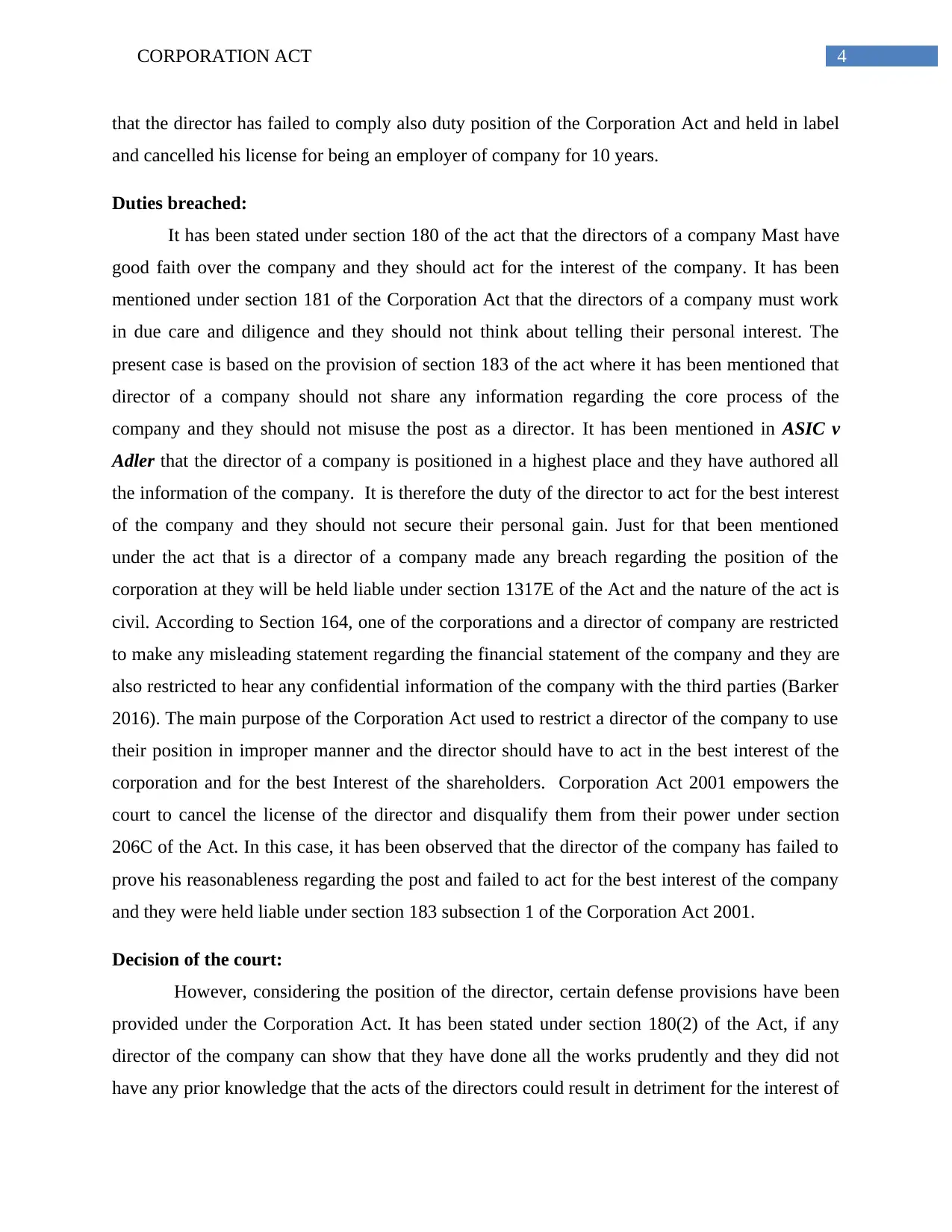
4CORPORATION ACT
that the director has failed to comply also duty position of the Corporation Act and held in label
and cancelled his license for being an employer of company for 10 years.
Duties breached:
It has been stated under section 180 of the act that the directors of a company Mast have
good faith over the company and they should act for the interest of the company. It has been
mentioned under section 181 of the Corporation Act that the directors of a company must work
in due care and diligence and they should not think about telling their personal interest. The
present case is based on the provision of section 183 of the act where it has been mentioned that
director of a company should not share any information regarding the core process of the
company and they should not misuse the post as a director. It has been mentioned in ASIC v
Adler that the director of a company is positioned in a highest place and they have authored all
the information of the company. It is therefore the duty of the director to act for the best interest
of the company and they should not secure their personal gain. Just for that been mentioned
under the act that is a director of a company made any breach regarding the position of the
corporation at they will be held liable under section 1317E of the Act and the nature of the act is
civil. According to Section 164, one of the corporations and a director of company are restricted
to make any misleading statement regarding the financial statement of the company and they are
also restricted to hear any confidential information of the company with the third parties (Barker
2016). The main purpose of the Corporation Act used to restrict a director of the company to use
their position in improper manner and the director should have to act in the best interest of the
corporation and for the best Interest of the shareholders. Corporation Act 2001 empowers the
court to cancel the license of the director and disqualify them from their power under section
206C of the Act. In this case, it has been observed that the director of the company has failed to
prove his reasonableness regarding the post and failed to act for the best interest of the company
and they were held liable under section 183 subsection 1 of the Corporation Act 2001.
Decision of the court:
However, considering the position of the director, certain defense provisions have been
provided under the Corporation Act. It has been stated under section 180(2) of the Act, if any
director of the company can show that they have done all the works prudently and they did not
have any prior knowledge that the acts of the directors could result in detriment for the interest of
that the director has failed to comply also duty position of the Corporation Act and held in label
and cancelled his license for being an employer of company for 10 years.
Duties breached:
It has been stated under section 180 of the act that the directors of a company Mast have
good faith over the company and they should act for the interest of the company. It has been
mentioned under section 181 of the Corporation Act that the directors of a company must work
in due care and diligence and they should not think about telling their personal interest. The
present case is based on the provision of section 183 of the act where it has been mentioned that
director of a company should not share any information regarding the core process of the
company and they should not misuse the post as a director. It has been mentioned in ASIC v
Adler that the director of a company is positioned in a highest place and they have authored all
the information of the company. It is therefore the duty of the director to act for the best interest
of the company and they should not secure their personal gain. Just for that been mentioned
under the act that is a director of a company made any breach regarding the position of the
corporation at they will be held liable under section 1317E of the Act and the nature of the act is
civil. According to Section 164, one of the corporations and a director of company are restricted
to make any misleading statement regarding the financial statement of the company and they are
also restricted to hear any confidential information of the company with the third parties (Barker
2016). The main purpose of the Corporation Act used to restrict a director of the company to use
their position in improper manner and the director should have to act in the best interest of the
corporation and for the best Interest of the shareholders. Corporation Act 2001 empowers the
court to cancel the license of the director and disqualify them from their power under section
206C of the Act. In this case, it has been observed that the director of the company has failed to
prove his reasonableness regarding the post and failed to act for the best interest of the company
and they were held liable under section 183 subsection 1 of the Corporation Act 2001.
Decision of the court:
However, considering the position of the director, certain defense provisions have been
provided under the Corporation Act. It has been stated under section 180(2) of the Act, if any
director of the company can show that they have done all the works prudently and they did not
have any prior knowledge that the acts of the directors could result in detriment for the interest of
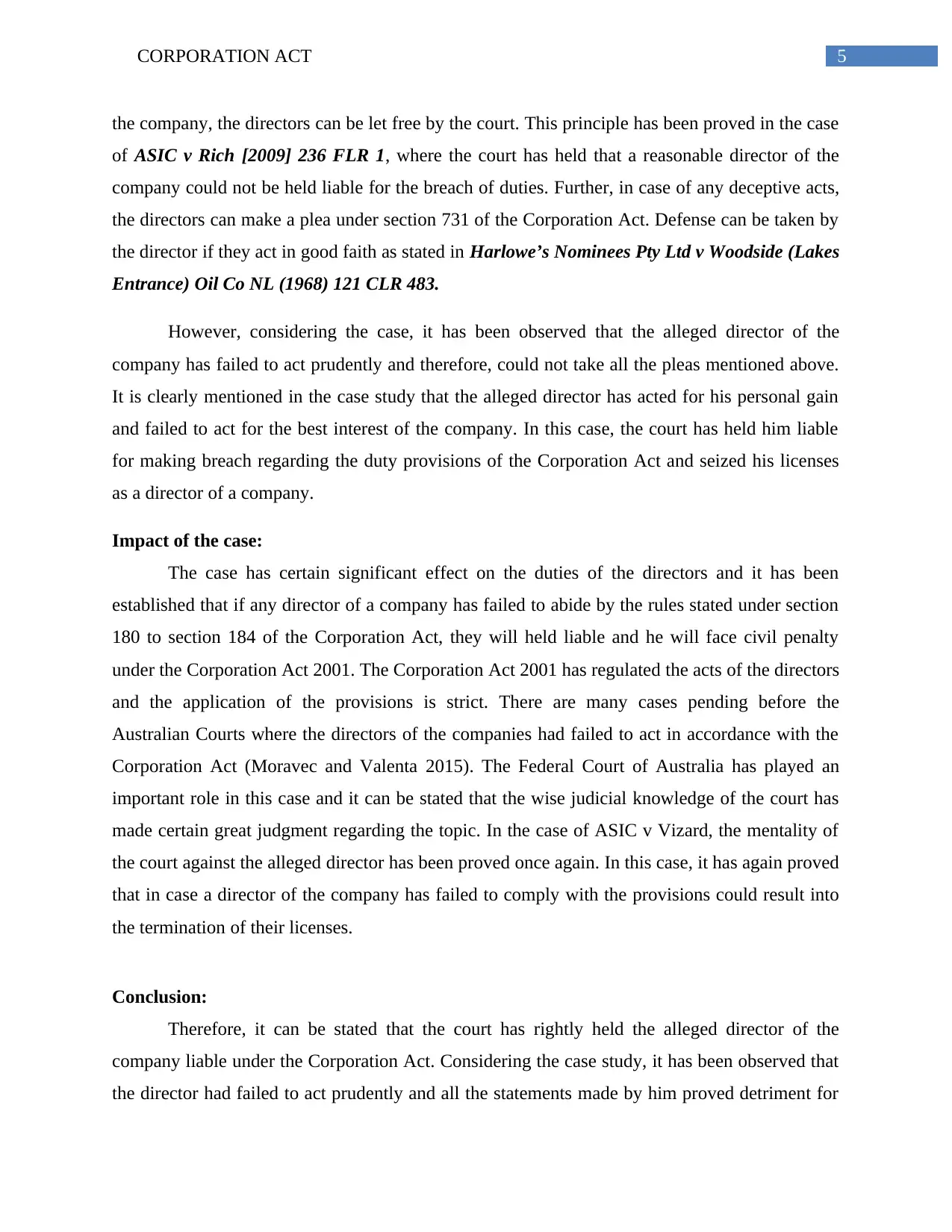
5CORPORATION ACT
the company, the directors can be let free by the court. This principle has been proved in the case
of ASIC v Rich [2009] 236 FLR 1, where the court has held that a reasonable director of the
company could not be held liable for the breach of duties. Further, in case of any deceptive acts,
the directors can make a plea under section 731 of the Corporation Act. Defense can be taken by
the director if they act in good faith as stated in Harlowe’s Nominees Pty Ltd v Woodside (Lakes
Entrance) Oil Co NL (1968) 121 CLR 483.
However, considering the case, it has been observed that the alleged director of the
company has failed to act prudently and therefore, could not take all the pleas mentioned above.
It is clearly mentioned in the case study that the alleged director has acted for his personal gain
and failed to act for the best interest of the company. In this case, the court has held him liable
for making breach regarding the duty provisions of the Corporation Act and seized his licenses
as a director of a company.
Impact of the case:
The case has certain significant effect on the duties of the directors and it has been
established that if any director of a company has failed to abide by the rules stated under section
180 to section 184 of the Corporation Act, they will held liable and he will face civil penalty
under the Corporation Act 2001. The Corporation Act 2001 has regulated the acts of the directors
and the application of the provisions is strict. There are many cases pending before the
Australian Courts where the directors of the companies had failed to act in accordance with the
Corporation Act (Moravec and Valenta 2015). The Federal Court of Australia has played an
important role in this case and it can be stated that the wise judicial knowledge of the court has
made certain great judgment regarding the topic. In the case of ASIC v Vizard, the mentality of
the court against the alleged director has been proved once again. In this case, it has again proved
that in case a director of the company has failed to comply with the provisions could result into
the termination of their licenses.
Conclusion:
Therefore, it can be stated that the court has rightly held the alleged director of the
company liable under the Corporation Act. Considering the case study, it has been observed that
the director had failed to act prudently and all the statements made by him proved detriment for
the company, the directors can be let free by the court. This principle has been proved in the case
of ASIC v Rich [2009] 236 FLR 1, where the court has held that a reasonable director of the
company could not be held liable for the breach of duties. Further, in case of any deceptive acts,
the directors can make a plea under section 731 of the Corporation Act. Defense can be taken by
the director if they act in good faith as stated in Harlowe’s Nominees Pty Ltd v Woodside (Lakes
Entrance) Oil Co NL (1968) 121 CLR 483.
However, considering the case, it has been observed that the alleged director of the
company has failed to act prudently and therefore, could not take all the pleas mentioned above.
It is clearly mentioned in the case study that the alleged director has acted for his personal gain
and failed to act for the best interest of the company. In this case, the court has held him liable
for making breach regarding the duty provisions of the Corporation Act and seized his licenses
as a director of a company.
Impact of the case:
The case has certain significant effect on the duties of the directors and it has been
established that if any director of a company has failed to abide by the rules stated under section
180 to section 184 of the Corporation Act, they will held liable and he will face civil penalty
under the Corporation Act 2001. The Corporation Act 2001 has regulated the acts of the directors
and the application of the provisions is strict. There are many cases pending before the
Australian Courts where the directors of the companies had failed to act in accordance with the
Corporation Act (Moravec and Valenta 2015). The Federal Court of Australia has played an
important role in this case and it can be stated that the wise judicial knowledge of the court has
made certain great judgment regarding the topic. In the case of ASIC v Vizard, the mentality of
the court against the alleged director has been proved once again. In this case, it has again proved
that in case a director of the company has failed to comply with the provisions could result into
the termination of their licenses.
Conclusion:
Therefore, it can be stated that the court has rightly held the alleged director of the
company liable under the Corporation Act. Considering the case study, it has been observed that
the director had failed to act prudently and all the statements made by him proved detriment for
⊘ This is a preview!⊘
Do you want full access?
Subscribe today to unlock all pages.

Trusted by 1+ million students worldwide

6CORPORATION ACT
the best interest of the company. It has further noticed that he had involved in various businesses
and failed to think systematically for the betterment of the company where he had been acted as
a non-executive director. According to the Corporation law, a director is the mind of a company
and therefore, he is required to make certain prudent decision. He must have to follow the rules
prescribed under the Corporation Act and should perform their duties diligently. It has been
mentioned in ASIC v Adler [2002] NSWSC 171, a director should not use his position to gain
personal interest and should not share the confidential information with the third parties. Further,
the Act mentions that the director, who acts for the interest of his personal profit, could not take
the plea of corporate veil. In this case, the alleged director has failed to maintain all his duties
and held liable under the Act of 2001.
the best interest of the company. It has further noticed that he had involved in various businesses
and failed to think systematically for the betterment of the company where he had been acted as
a non-executive director. According to the Corporation law, a director is the mind of a company
and therefore, he is required to make certain prudent decision. He must have to follow the rules
prescribed under the Corporation Act and should perform their duties diligently. It has been
mentioned in ASIC v Adler [2002] NSWSC 171, a director should not use his position to gain
personal interest and should not share the confidential information with the third parties. Further,
the Act mentions that the director, who acts for the interest of his personal profit, could not take
the plea of corporate veil. In this case, the alleged director has failed to maintain all his duties
and held liable under the Act of 2001.
Paraphrase This Document
Need a fresh take? Get an instant paraphrase of this document with our AI Paraphraser
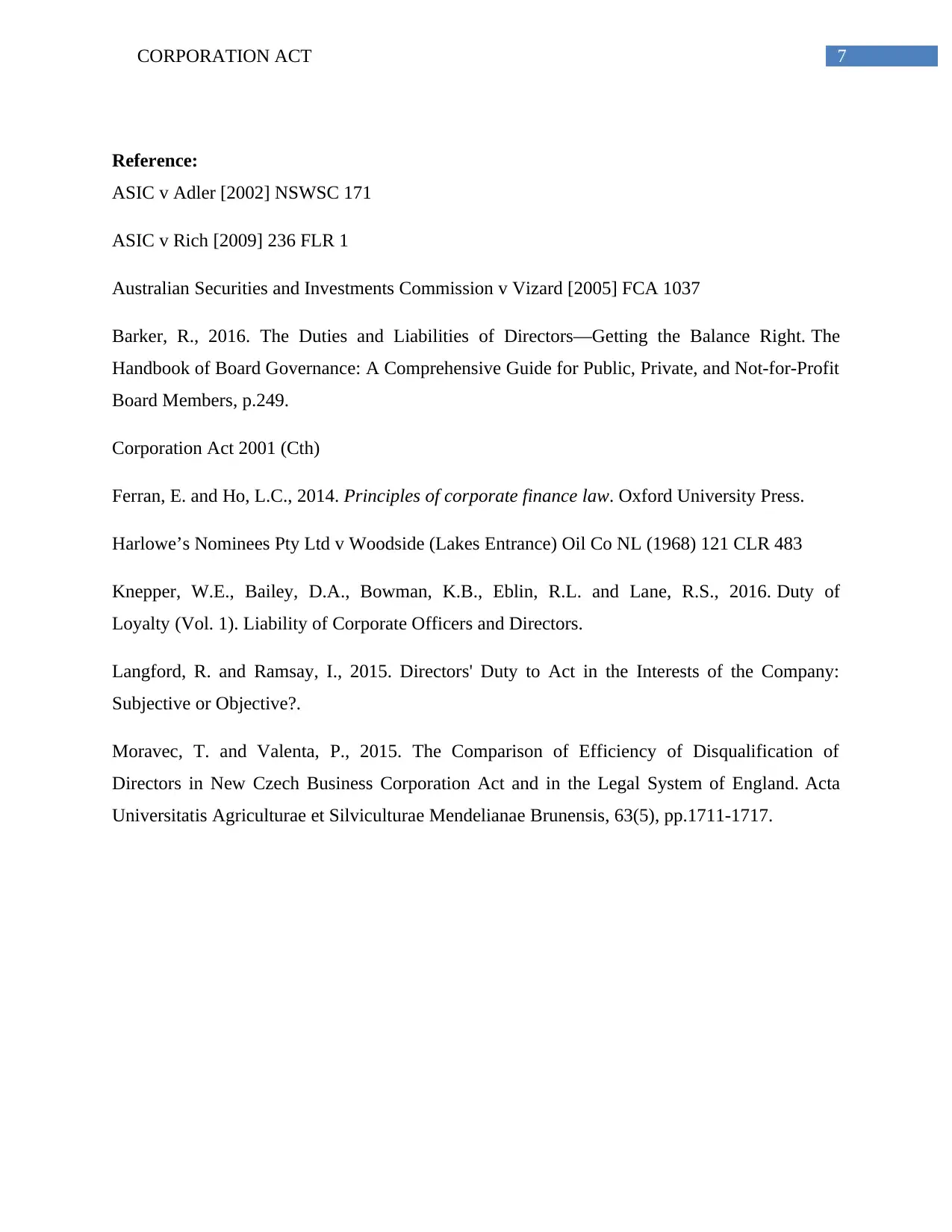
7CORPORATION ACT
Reference:
ASIC v Adler [2002] NSWSC 171
ASIC v Rich [2009] 236 FLR 1
Australian Securities and Investments Commission v Vizard [2005] FCA 1037
Barker, R., 2016. The Duties and Liabilities of Directors—Getting the Balance Right. The
Handbook of Board Governance: A Comprehensive Guide for Public, Private, and Not-for-Profit
Board Members, p.249.
Corporation Act 2001 (Cth)
Ferran, E. and Ho, L.C., 2014. Principles of corporate finance law. Oxford University Press.
Harlowe’s Nominees Pty Ltd v Woodside (Lakes Entrance) Oil Co NL (1968) 121 CLR 483
Knepper, W.E., Bailey, D.A., Bowman, K.B., Eblin, R.L. and Lane, R.S., 2016. Duty of
Loyalty (Vol. 1). Liability of Corporate Officers and Directors.
Langford, R. and Ramsay, I., 2015. Directors' Duty to Act in the Interests of the Company:
Subjective or Objective?.
Moravec, T. and Valenta, P., 2015. The Comparison of Efficiency of Disqualification of
Directors in New Czech Business Corporation Act and in the Legal System of England. Acta
Universitatis Agriculturae et Silviculturae Mendelianae Brunensis, 63(5), pp.1711-1717.
Reference:
ASIC v Adler [2002] NSWSC 171
ASIC v Rich [2009] 236 FLR 1
Australian Securities and Investments Commission v Vizard [2005] FCA 1037
Barker, R., 2016. The Duties and Liabilities of Directors—Getting the Balance Right. The
Handbook of Board Governance: A Comprehensive Guide for Public, Private, and Not-for-Profit
Board Members, p.249.
Corporation Act 2001 (Cth)
Ferran, E. and Ho, L.C., 2014. Principles of corporate finance law. Oxford University Press.
Harlowe’s Nominees Pty Ltd v Woodside (Lakes Entrance) Oil Co NL (1968) 121 CLR 483
Knepper, W.E., Bailey, D.A., Bowman, K.B., Eblin, R.L. and Lane, R.S., 2016. Duty of
Loyalty (Vol. 1). Liability of Corporate Officers and Directors.
Langford, R. and Ramsay, I., 2015. Directors' Duty to Act in the Interests of the Company:
Subjective or Objective?.
Moravec, T. and Valenta, P., 2015. The Comparison of Efficiency of Disqualification of
Directors in New Czech Business Corporation Act and in the Legal System of England. Acta
Universitatis Agriculturae et Silviculturae Mendelianae Brunensis, 63(5), pp.1711-1717.
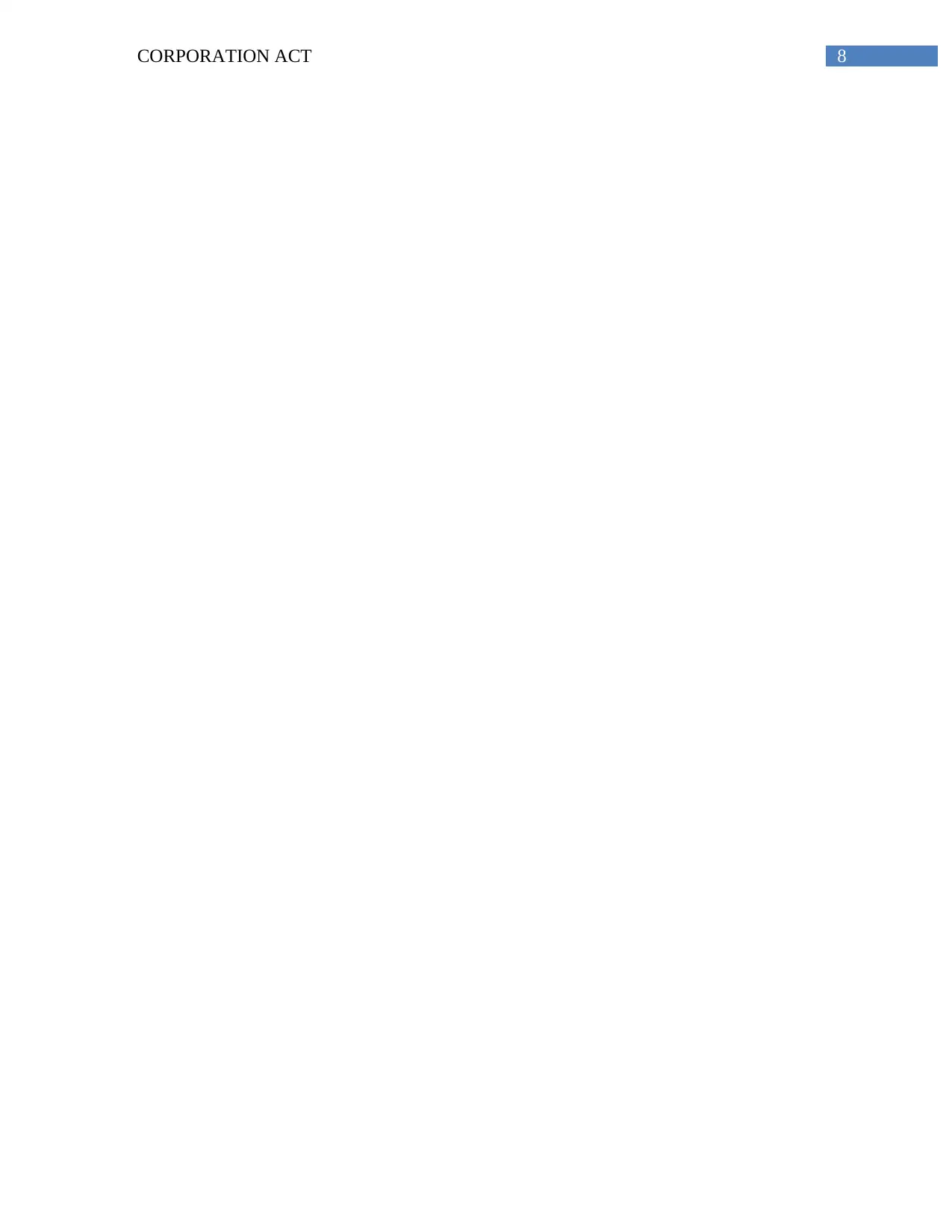
8CORPORATION ACT
⊘ This is a preview!⊘
Do you want full access?
Subscribe today to unlock all pages.

Trusted by 1+ million students worldwide
1 out of 9
Related Documents
Your All-in-One AI-Powered Toolkit for Academic Success.
+13062052269
info@desklib.com
Available 24*7 on WhatsApp / Email
![[object Object]](/_next/static/media/star-bottom.7253800d.svg)
Unlock your academic potential
Copyright © 2020–2026 A2Z Services. All Rights Reserved. Developed and managed by ZUCOL.





